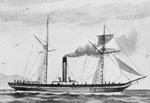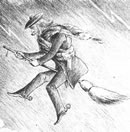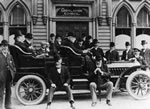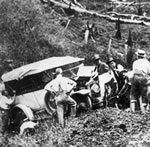MPs: Travel
One of the biggest hassles MPs faced before the mid twentieth century was just getting to Parliament. Right from the very first Parliament in 1854, politicians struck travel problems; it took two months for the first Otago members to get to Auckland by ship, and even then, they arrived in the nick of time. First there were lengthy stops at Lyttelton, Nelson and Wellington. Then head winds forced the ship back through Cook Strait, and it had to sail up the east coast, around North Cape and down to Onehunga. No wonder MPs like Henry Sewell vowed they would never return to Auckland 'except under compulsion' and Otago MPs preferred to return home via Sydney rather than risk the government brig again!
Rocky trips
There were rocky trips galore for these early politicians. In 1856 William Fox described sailing to Auckland along with about 150 sheep and 'wading through mud-flat or carried on boatmen's backs' at Onehunga. In 1861 Parliament was delayed by several days because the Wellington MPs had not arrived. Their trip was miserable and overcrowded. One had to sleep in a small cabin used as a pantry while another slept in the hold. A whopping roll from a wave sent unwashed plates and cutlery and a bottle of beer crashing down on the head of one of them.
Moving Parliament to Wellington made things easier only for the Wellington MPs. The Worsley brought the southern MPs a day after the session was due to begin. On the way down from Auckland Premier Fox, his cabinet and Auckland politicians were shipwrecked when the White Swan hit rocks off the Wairarapa coast. The Harrier, carrying Governor Grey arrived days later, having been blown virtually to the Chatham Islands.
Related sound file: The Wreck of the White Swan (563k, mp3). Transcript and more information for this file.
By the 1880s ships were larger, faster and more reliable. Railways, roading and harbours had been greatly developed during the 1870s and from the mid 1890s a scheduled inter-island ferry service connected with rail services in both islands. The Union Steam Ship Company would delay vessels to suit governments, and sometimes even waive fares. Despite these changes arduous journeys on horseback or by coach were still the only way to service many electorates.
All Aboard the Parliament Special
MPs travelling by rail received free gold medallion railway passes. Dangled from their watch-chains or hung around their necks on a chain, these passes were symbolic and instantly recognisable badges of office. Rail travel in the North Island remained difficult before the completion of the main trunk in 1908. The government offered the engineer in charge £1,000 to finish it in time for the parliamentary party to travel to Auckland by rail in August 1908 to greet the American 'Great White Fleet', which was on a world tour. The Public Works Department laboured desperately, taking many shortcuts, and joined the lines from north and south just in time.
Railway guard Mr Field talks about getting MPs to Auckland in 1908 on 'The parliamentary train' (483k, mp3). Transcript and more information for this file.
On the road
The first motorcars in New Zealand were demonstrated in Parliament grounds in 1898 before they were allowed on the roads. William McLean, who owned the two Benz vehicles, lobbied for a private member's bill in Parliament to allow him and others to use them. The verdict on these new-fangled machines was mixed. Legislative Council member Richard Oliver, who had ridden in one in Britain, said they were 'most unpleasant....The one he rode in was so "smelly" that it almost made him sick, and the vibration of the motion was an additional incentive to sickness....if careering along the streets of a town at the rate of twelve miles an hour [it] would be a source of danger to other travellers.' Other MPs were dazzled by the vehicles.
Touring the winterless north
In January 1917 a cavalcade of cars carried a delegation of MPs on the 'Winterless North Tour' to highlight Northland's poor roading. The weather was, appropriately, appalling, and made the bad road conditions even worse. Rain turned the clay hills to mud and slush, and the MPs spent their days fording swollen rivers, heaving vehicles out of the mud and dealing with punctures.
Parliament's hours were changed in 1929 to recognise the travel hassles MPs faced. To let politicians get away for the weekend the House sat on Friday mornings. Flying grew more popular after the war, but some older MPs, not keen to take their chances in the air, still took the train or ferry. Regular air travel eventually changed sessions by enabling MPs to go home each week or to return to Wellington during the recess.
Next: Staff and spectators >




